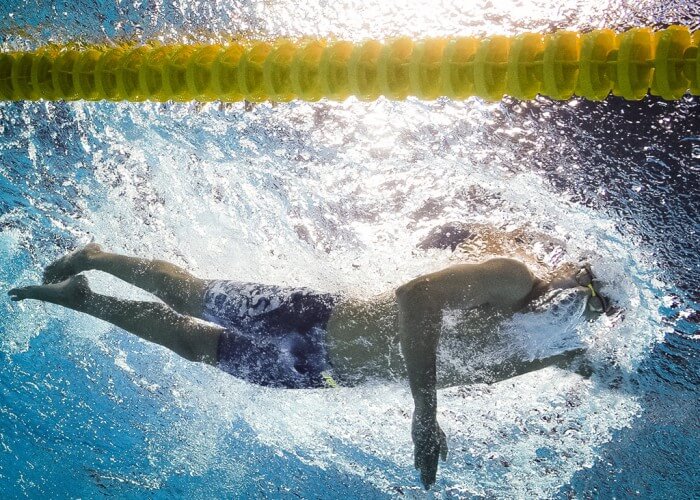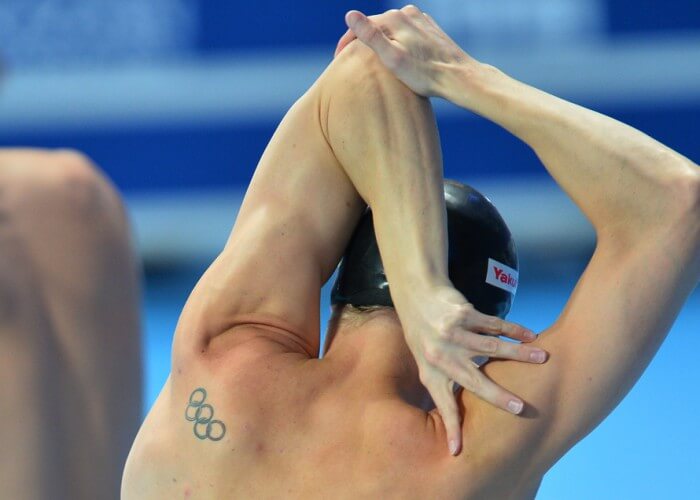3 Ways to Help Prevent Swimmer’s Shoulder

3 Ways to Help Prevent Swimmer’s Shoulder
By Shunichi Fujishima, Swimming World College Intern.
Research done by the North American Journal of Sports Physical Therapy suggests that one third of competitive swimmers experience what is known as Swimmer’s Shoulder, which is a term used to describe a shoulder that is inflamed due to overuse. This consistent irritation in the shoulder limits swimmers’ training in and out of the water.
If a swimmer takes 12 strokes to complete 25 yards, and their workout is 3500 yards long, that means that the athlete will rotate their shoulder about 1680 times! If that swimmer swims six times per week, that would mean he or she would be performing on average, 10,080 strokes per week. If a swimmer does end up with pain in their shoulder, it is best that they go see a physiotherapist nearby. Gaining an early and correct diagnosis is very important in order to get the best treatment and get the swimmer back in the pool as soon as possible.
Here are three ways to prevent yourself from experiencing the infamous Swimmer’s Shoulder…
1. Fix your Stroke Technique

Photo Courtesy: R-Sport / MIA Rossiya Segodnya
This is a win-win situation because you get to fix your stroke to be more efficient in the water, as well as avoiding a shoulder injury. Japanese National Team Coach, Yoshihiro Fujimori, says that one of the easiest ways to not only get power from your swim but to avoid shoulder injury is to keep your shoulders loose and un-shrugged at all times throughout the stroke.
Shrugging your shoulders during the pulling process gives unneeded tension to the small but important muscles in your shoulders. Insufficient body roll in freestyle could cause excessive pulling on the tendons. A lot of swimmer’s thumb and pointer fingers enter the water first, but that results in an excessive internal rotation, which leads to shoulder impingement. Another factor which needs to be taken into account is how you are pulling through the water. If you tend to cross over the midline of your body or pull water with a straight arm or with a dropped elbow, those are all factors that could potentially lead to excess pressure on your inner rotator cuffs.
2. Stretching and Recovery

Photo Courtesy: R-Sport / MIA Rossiya Segodnya
Over-training, without proper recovery time, could increase your chance of getting Swimmer’s Shoulder. Proper recovery in any sport is as important as the actual workout itself. Joshua Brown, who will be swimming for Princeton University starting this fall, believes getting a good night’s sleep and stretching is the best way to recover from practice. Stretching will help relieve muscular tension. In addition, flexibility is a necessity in swimming if you want to be faster. Not all competitive swimmers get the luxury of getting a nap between morning and afternoon workouts. Things that could compensate for that is to work on excellent pre-workout nutrition, post-workout protein, and eating potassium-rich foods daily.
3. Strengthen the Inner Rotator Cuffs

Photo Courtesy: Dr. G John Mullen
It’s a misconception that only working your biceps and triceps on your arm will make you a better puller in swimming. What helps you move and flex those bigger muscles are the inner rotator cuffs. When working on the inner rotator cuffs, it is very important to be cautious since it is a delicate muscle. External rotation of your shoulder using a light elastic band and external rotation at 90-degree abduction are very useful preventative exercises which strengthen the tendons inside your shoulder.
Technique/Training: All swimming and dryland training and instruction should be performed under the supervision of a qualified coach or instructor, and in circumstances that ensure the safety of participants.




Rebecca Baley Snook
Thanks Tim! What used to be a natural thing I now have to be conscious of my stroke. Ugh
Julianna Bender Margaret M. Bender
Stacey Donovan Smith Maudjah Norman Francis
Jagger Highberger
Brittany Biggs
Mindy Park
Jasson Velez
Josh Barila
Ella Jamieson
Seth Angel
Ashleigh Botha
Kyle
Wouter Remmerie
Vanessa – thought of you after reading this.
Janelle Edmonds wish we knew this 10 years ago..
Would been nice…
Alyssa Oestreich you should read this.
Moataz Ali Mohammed
Chloe Donday
Devin Anderson
Alicia Tiberino